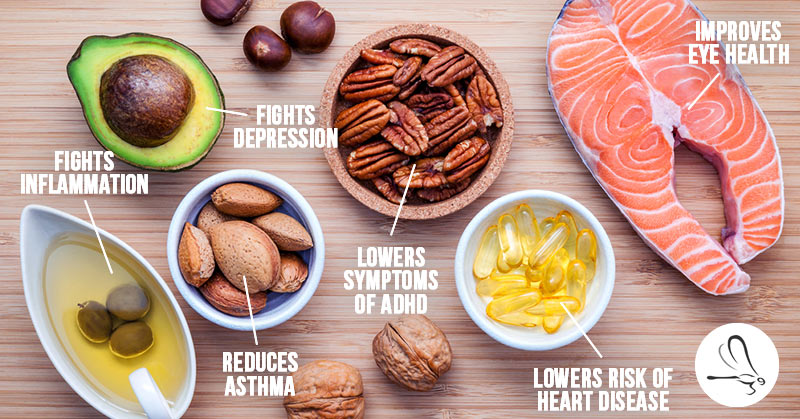Thanks to countless media reports, scientific studies and recommendations from health professionals (including yours truly), it’s pretty safe to say that the fact that healthy fats are good for us is common knowledge. Still, though, many consumers are still opting for low-fat foods when they hit the grocery store, which ultimately points to a lingering fear of eating too much fat. But while subconscious beliefs may tell us that those 100-calorie snack packs are a quicker route to toned abs than a big scoop of guacamole, the opposite may be true. And not only will you not lose weight by avoiding healthy fats, a new study suggests that low-fat diets may also be harmful to your health.
RELATED STORY:
The Truth About Fat
 While it’s true that they contain more calories than carbs or protein, dietary fats are essential for functions like appetite control, mental health, and nutrient absorption. Why then—and at what point—did fat start becoming demonized?
While it’s true that they contain more calories than carbs or protein, dietary fats are essential for functions like appetite control, mental health, and nutrient absorption. Why then—and at what point—did fat start becoming demonized?
Well, starting around the 1970s, higher-fat foods began to be vilified in many industrialized nations, especially in the U.S. This triggered what’s been called the “low-fat revolution,” in which dietary guidelines were adjusted to emphasize the importance of eating carbohydrates, while the public was warned to reduce their overall fat intake. Trusted health organizations like the American Heart Association even recommended that people avoid most sources of saturated fat and increase consumption of foods like whole grain bread and low-fat (and highly processed) dairy products.
Over the past two decades, numerous studies have shown that a low-fat diet often backfires, contributing to overeating, weight gain and increased inflammation. And an August 2017 study published in the Lancet that used data from the Prospective Urban Rural Epidemiology study (or PURE study) found that contrary to popular belief, higher fat consumption actually has protective effects and isn’t correlated with a higher heart disease risk.
RELATED STORY:
The goal of the PURE study was to investigate associations between fat and carbohydrate intake, as well as risk for cardiovascular disease and mortality (death). Researchers followed over 135,000 people living in 18 countries on five continents, and one of their main findings was that consuming a higher amount of fat (around 35 percent of daily calories) is associated with a lower risk of death compared to lower intakes of fat and higher intakes of carbohydrates. Conversely, obtaining more than 60 percent of daily calories from carbs was associated with higher mortality (though not a higher risk for cardiovascular disease).
Eat Moderate Amounts of Healthy Fats
How are these results possible?
The study’s findings suggest that low-fat diets seem to lead to less satiety (the feeling of fullness after eating), and they may also contribute to increased dependence on sugar and simple, processed carbs to reach calorie benchmarks and obtain that feeling of satiety. When it comes to healthy fats versus processed carbs, all calories are not to be equal. It’s not that all carbs should be feared—we need them to keep our energy up and help us to recover from exercise, for example—but many people eat far more carbohydrates than they actually need, and they’re eating the wrong types.
Overall, the PURE study found that moderate consumption of carbohydrates (especially from whole foods that provide fiber, like fruits and vegetables), along with moderate intake of healthy fats, is the best dietary approach for disease prevention.
RELATED STORY:
That being said, there are still certain types of fats to avoid or limit, mainly processed fats including the hydrogenated oils and trans-fats found in packaged foods, fast foods, and fried foods. But there’s certainly no reason to fear eating plenty of healthy fats that are derived from foods like avocados, coconut oil or coconut milk, olive oil or olives, nuts, seeds, eggs, fish, meat/poultry and even real butter.
 I suggest getting about 35 percent of your calories each day from sources of healthy fats, and less than 60 percent from carbohydrates—a recommendation is in line with healthy, research-backed diets such as the Mediterranean Diet. And below are some actionable steps you can take to replace unhealthy low-fat foods in your diet with healthy fats:
I suggest getting about 35 percent of your calories each day from sources of healthy fats, and less than 60 percent from carbohydrates—a recommendation is in line with healthy, research-backed diets such as the Mediterranean Diet. And below are some actionable steps you can take to replace unhealthy low-fat foods in your diet with healthy fats:
- Instead of choosing low-fat dairy products, such as skin milk or “diet” yogurts, go for full-fat (and ideally plain/unsweetened) versions instead.
- Don’t shy away from eating eggs regularly, including the yolks which contain many important nutrients such as choline, lutein, B vitamins and iron.
- Eat fatty fish 2-3 times per week, especially wild-caught salmon and sardines that provide omega-3s.
- Cook vegetables and proteins in quality oils like coconut or virgin olive oil, or in grass-fed butter. While you don’t have to go heavy with added oils or butter, remember that a bit is needed for proper absorption of fat-soluble nutrients.
- Top salads with a simple, homemade dressing made with extra virgin olive oil and vinegar. Steer clear of sweetened, bottled dressings that are made with refined vegetable oils.
- Snack on nuts, smear some nut butter on fruit, or use seeds in smoothies and on salads.
- Take a “nose to tail” approach to eating animal products. I.e., it’s okay to eat fattier cuts of meat and even to use traditional lard when cooking, as long as it’s done in moderation.
- Aim to consume about three to four servings (or a total of 375 to 500 grams) of quality carbohydrates daily, especially fresh fruits, raw vegetables and legumes like black beans, lentils, peas, chickpeas. This is the amount that was correlated with the best health outcomes while eating more didn’t necessarily offer any additional benefits.
- Reduce your intake of simple, refined carbohydrates, especially products made with white flour and sweetened beverages. Surveys have found that some of the leading contributors to weight gain, inflammation and other health problems in the American diet are foods like cakes, cookies, bread, cereals, pizza, soda and other sugary drinks.
*Article originally appeared at Healthy Holistic Living.












